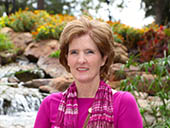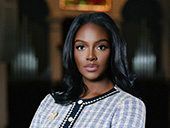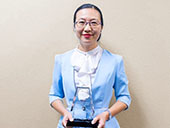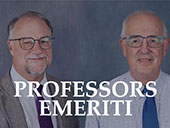Waging Hope: New Faculty Member Dr. Julie Leslie, Her Husband Gary, and Their Cancer Story
This article is over six months old and may reference former titles for DBU faculty or staff, discontinued programs, or other details that have since changed. If you have any questions, please contact us at news@dbu.edu, or (214) 333-5172.
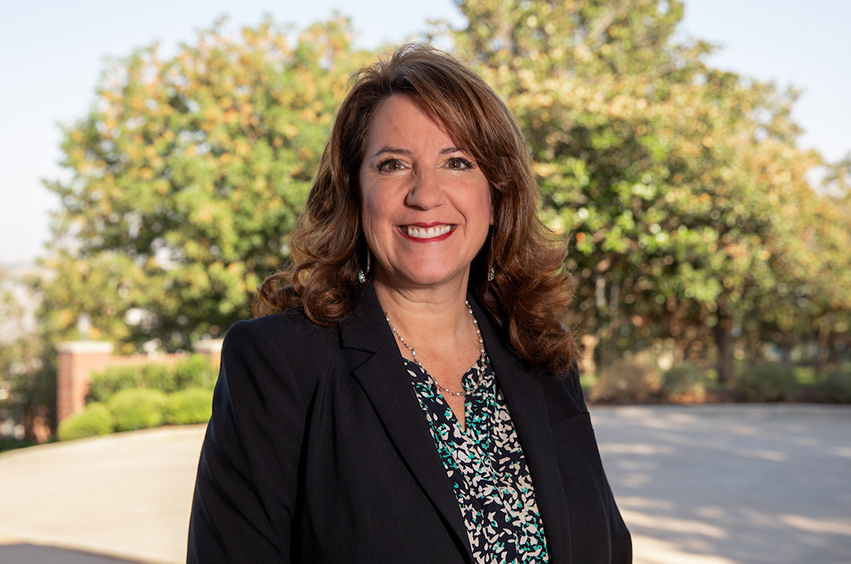
Dr. Julie Leslie holds an M.S. in Secondary and Higher Education from Texas A&M Commerce and completed her doctorate at DBU in 2021. She recently joined the DBU Faculty as Director of Research for the Ed.D., K-12 program.
In 2016, Dr. Leslie and her husband, Gary, started a difficult journey in a battle with his life-threatening pancreatic cancer, which caused her to temporarily pause her doctoral studies. The following is her personal account of the difficult days following the devastating news in 2016, their raw and authentic struggles in the valley, and their determination to wage hope in the face of discouragement and fear.
"Waging Hope"
I went with Gary to his doctor's appointment on August 15, 2016. I hadn't planned on being there, but a late afternoon meeting was canceled at the last minute, so I jumped in my car and sped south on 121. At that time, I was working at a central office in Frisco ISD.
We ended up waiting nearly an hour to see the doctor, first in the waiting room and then in an exam room. (We now know that the doctor wanted Gary to be his last patient of the day.) Finally, the doctor walked in, and I'll never forget that conversation. A former Special Ops Medic in the US Army, this doctor bears the scars from bloodshed and battle. He got straight to the point.
"There's no good way to say this, so I'm just going to say it: you have pancreatic cancer."
"What?" Gary asked. He blinked in confusion. "What did you say?"
"You have pancreatic cancer," the doctor repeated in a softer tone. "You have a tumor on your pancreas, so you most likely have cancer. These things are almost never benign."
I recall so vividly – even in my complete disbelief – Gary holding up the piece of paper on which he'd listed all the symptoms for gallstones and saying, "But my symptoms are on the list for gallstones…" and the doctor's response, "Yes. But those are also symptoms of pancreatic cancer. You didn't know to Google pancreatic cancer." Gary just stared at the doctor. And me? I couldn't quit staring at that stupid piece of paper Gary continued to hold up. I was seeing the list, Gary's strong hand, and his wedding ring all at once in a beautiful, obscene image that defined this devastating moment.
Silence. We all just sat there.
Then Gary spoke, "Now what?"
"Two things," the doctor answered. "The first is don't wait. You'll be sad and maybe even angry, but don't be in denial. Pancreatic cancer is too aggressive and too deadly. Here's the number of an oncologist. Get in his office. TOMORROW. I'm sending your test results over there tonight."
Gary exhaled. "Alright. What's the other thing?"
"Don't Google pancreatic cancer." Then the doctor looked straight at me. "I know you. The first thing you're gonna want to do is go home and research this on the internet. I strongly advise against doing that. You'll get lost in all the technical stuff, and the numbers will paralyze you with fear. You absolutely cannot get paralyzed or be in denial. You've got to MOVE on this. Tonight, you can go out and eat a big steak, or go home and cry. Or both. Do what you've gotta do tonight, but tomorrow? Tomorrow you MOVE."
I froze. Not usually at a loss for words, I couldn't speak. Finally, my brave husband spoke, "So, what are the numbers?"
More silence.
Then the doctor took a deep breath, "One statistic is 1 in 20. One in 20 live five or more years after being diagnosed." His face was solemn.
Gary quickly did the math, "That's 5%."
"Yes. I've seen another statistic that's 8%. But there are many variables that we don't know yet, including if the cancer has spread and the exact location of the tumor relative to a major vein. This is why I told you not to Google this tonight. There are still too many things you don't know. You're young for a typical pancreatic cancer patient, and you're in otherwise great health. Those two things are huge. But this is why you've got to move fast."
We were totally and completely SHOCKED. Speechless. We sat in silence again. Finally, Gary and I stood together and walked hand-in-hand out of the doctor's office. Upon reaching the parking lot, we clung to each other and sobbed. When Gary and I got home, we clung to each other again and wept some more. When we couldn't cry anymore, we started talking. We talked into the night, and we made two very important decisions: 1) to trust God and 2) to fight this battle together. I fell asleep that night praying for strength and courage. I had never, ever been so afraid.
The next two years were some of the hardest in my life. I wound up dropping out of DBU's Ed.D. K-12 doctoral program, which added more pain because I so loved Cohort 8. Five months later, I had to quit my job in FISD. Gary was just so, so sick and needed full-time care. That fall he endured eight rounds of chemotherapy that included a cocktail of three different drugs. The prayers then were that he could withstand this regimen, which was the strongest mix in the oncologist's arsenal, that the side effects would be bearable enough, and that upon surgical examination, the tumor would be far enough from a major vein to be operable. Millimeters mattered.
During Thanksgiving week Gary had what's known as the Whipple Procedure. We learned that the Whipple is one of the most complicated surgeries in all of medicine because parts of the intestines, pancreas, and stomach are removed, requiring the surgeon to completely reconfigure the patient's digestive system. The surgery lasted nearly eight hours (I was afraid Gary would die on the table), but the surgeon believed he got the entire tumor. That was the good news (great news!); the bad news was that he would only get about a month to recover from the surgery before starting chemo again. The fear was that the cancer had metastasized, so these months of chemo were referred to as "mop up" chemo.
After the Whipple, the body has to re-learn how to process food. Nerves are deadened for the procedure, so they have to slowly come around and then respond differently to all of the processes that occur during the digestive process. Gary dropped 40 pounds. He had good days, of course, but so many were hard and frightening. And some of the nights were worse. It always seemed like the scariest side effects hit at night.
By any chance have you noticed how many times I used the words fear, frightening, and scary? In those early weeks, I was scared of so many things:
- Would Gary survive?
- How would his sons handle his death if he didn't?
- How would I handle it?
- Would I have to quit my job?
- Would insurance cover everything, or would this bankrupt us?
- What if I messed up on giving him his medicines?
- What if I misjudged a side effect and didn't rush him to the ER when I should have?
- What if he passed out and got a concussion?
- How would this impact our marriage?
- What if? What if? What if?
These crazy questions seemed to be on an endless loop inside my head. I even had some back pain, which I realized was because I was constantly holding my breath. I was praying, too, of course. I was praying so, so hard… and so many were praying for us, but I was still so afraid! I've since read that some caregivers feel anger, but I never felt anger. I was just really afraid. I've been a Christian all my life, and my faith had been tested in two significant ways prior to this situation, but this thing with Gary scared me more than those other two situations had.
Then I also began to feel shame – shame because I was so afraid. I intellectually knew that God doesn't give us a spirit of fear, yet I was feeling so afraid. I intellectually knew the Scriptures about not having fear, but emotionally I couldn't get there. I couldn't yet feel the hope and peace "which surpasses all understanding" (Philippians 4:7).
Enter stage left the Pancreatic Cancer Action Network. This group is connected to UT-Southwestern and sent Gary a t-shirt with their logo on it. The logo simply states "Wage Hope." We brought that shirt home, and I just stared at it while Gary slept. Wage Hope. Wage. Hope. Wage… wage… wage… where had I heard that word used as a verb? Then I thought of the idiom "wage battle." That's when it hit me! Battles are active! You have to fight in a battle! You "wage battle!"
HOPE isn't an emotion – it's a mindset. Hope by itself isn't necessarily a strategy either, but out of a hopeful mindset can come your life-giving strategy. Your action plan. Your battle plan. The various things you can actually do to fight feelings of anger, despair, paralyzing fear, or bitterness in the face of a challenging situation. I know it likely sounds impossible or "Pollyanna" given the situation you might be facing, but I strongly believe that if we can decide to choose hope, we must then DO things that help us stay in this hopeful mindset. We must first CHOOSE and then DO.
I'm still learning that sometimes choosing hope has to be daily and purposeful. Gary and I had decided that very first night that we would have faith in God's perfect plan – even if we couldn't understand it - and that we would fight. That was our CHOICE. Another of my first choices was to follow the first doctor's advice to not research pancreatic cancer. Instead, I chose to read about how to FIGHT cancer – not about how cancer kills.
The real gift here is that researching something positive – in my case, the health benefits of eating more plants and reducing sugar intake – created positive momentum. Instead of reading about cancer, I was reading about life! This shift made a tremendous impact on our approach to such a life-threatening, scary diagnosis. For me, reading how others fought cancer through their diet and learning how to make healthy, flavorful recipes gave me something to DO. It engaged my brain and was a productive outlet for my nervous energy. It was a way to PRO-act, to begin breathing again. So much of the cancer journey and chemo's side effects make you feel powerless, like a victim, like all you can do is RE-act. Certainly, Gary and I did have to react to side effects and what he could or couldn't eat, but it helped our emotional head game tremendously to engage in things that were PRO-active. This was a game-changer for us. Play defense when necessary, but also go on offense.
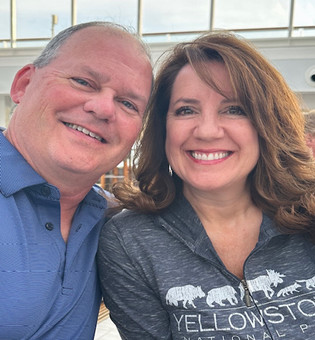 By God's grace, mercy, and we believe divine intervention, Gary lived! After he completed the "mop up" chemo, he gained back some weight and got stronger. Even more miraculously, Gary has almost no long-term effects of having fought such a serious digestive cancer. Thanks to my ninjalike smoothie and salad-making skills, he eats more spinach and kale than he cares to admit as a Texan. He eats smaller portions, and he can't tolerate meals that are high in fat since he had one-third of his pancreas removed. He also has a scar that stops people in their tracks on the beach, but for him, it's a battle scar. We like the mountains better anyway.
By God's grace, mercy, and we believe divine intervention, Gary lived! After he completed the "mop up" chemo, he gained back some weight and got stronger. Even more miraculously, Gary has almost no long-term effects of having fought such a serious digestive cancer. Thanks to my ninjalike smoothie and salad-making skills, he eats more spinach and kale than he cares to admit as a Texan. He eats smaller portions, and he can't tolerate meals that are high in fat since he had one-third of his pancreas removed. He also has a scar that stops people in their tracks on the beach, but for him, it's a battle scar. We like the mountains better anyway.
We believe that the epiphany I experienced about waging hope was a gift from God. Looking back, I feel so LOVED by God because He stepped into my fear and gave me this epiphany: Cancer, chemo, side effects, and constantly being at the mercy of so many medical professionals all make you feel powerless, afraid, and small, but you can win the head game by waging hope! Many others have written about this, but it was my own personal realization that we believe was a gift from God sent in the form of a t-shirt. Isaiah 41:10 (NIV) states, "So do not fear, for I am with you. Do not be dismayed, for I am your God. I will strengthen you and help you. I will uphold you with my righteous right hand."

